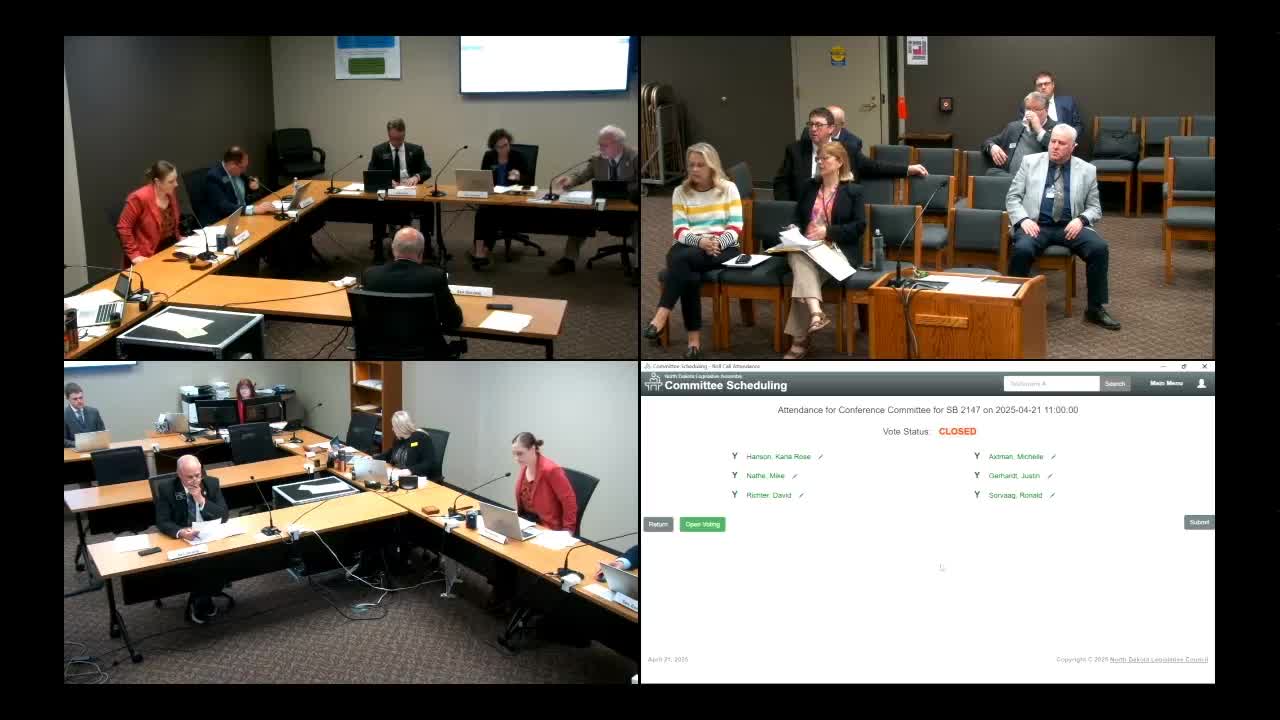Conference committee keeps limit that scholarships cannot exceed cost of attendance, debates funding level for Senate Bill 2147
Get AI-powered insights, summaries, and transcripts
Subscribe
Summary
A North Dakota conference committee agreed to retain language preventing scholarships from exceeding a student's cost of attendance but did not settle on an appropriation. Lawmakers debated proposals that would leave the program with $7 million this session or raise the bill-side amount to produce about $8.5 million in total.
The conference committee on Senate Bill 2147 agreed Thursday to keep language preventing the bill's scholarships from exceeding a student's cost of attendance, but members did not reach agreement on how much money to appropriate and scheduled another meeting to try again.
Representative Tony Victor, who presented a funding chart to the panel, said the package currently under consideration would leave the program with $7,000,000 in total because the higher-education budget added $5,000,000 to a $2,000,000 bill-side appropriation.
"So right now, this program has $7,000,000 in it," Representative Victor said. He also said the worksheet the committee received estimates the program would cover about 2,400 students and that, at the $7,000,000 level, the award equates to roughly $729 per student.
Brenda Zastepo of the North Dakota University System told the committee the system historically awards aid to about 6,300 students per year and that most recipients'roughly 90 to 95 percent'attend full time. "On average, we pretty consistently award about 6,300 students per year," Zastepo said. She also offered the committee an estimate that allowing awards to exceed cost of attendance would cost the system about $60,000 a year.
Committee members debated three funding references in the materials: an original bill-side figure the committee recorded as "$12.1" (the original bill amount), a $2,000,000 figure in the current bill, and the $7,000,000 total that results when higher-education budget additions are included. Senators and representatives disagreed about whether to restore the larger original appropriation and about a smaller compromise suggested by one senator.
Senator Sarvag (senior senator on the committee) and others emphasized why the income threshold under discussion was set at 80 percent of the federal calculation: "the only reason the 80 was picked, obviously, is because it matches the Pell Grant," Sarvag said, arguing for keeping the 80 income limit so the new state aid aligns with Pell eligibility.
One senator suggested a compromise to increase the bill-side appropriation by $1.5 million to $3.5 million; with the $5,000,000 in the higher-education budget, that would bring total funding to about $8.5 million. Representative Nathie (House conferee) said the House preference was to hold to the current bill-side $2,000,000 plus the higher-education addition, calling $7,000,000 "a pretty good start for this program."
The committee discussed whether the bill should include the word "not" to prevent scholarship awards from exceeding a student's cost of attendance. Committee members noted that "cost of attendance" is defined to include tuition and fees, books and supplies, housing and food, transportation, child care and other related expenses. Representative Victor and others argued restoring the word "not" would avoid unintentionally directing larger awards to a small number of students and preserve support for more students overall. Representative Richter used dual-credit scholarships as an example where a limited exception may be appropriate because those awards function as a partial payback to families who paid tuition while a student was in high school.
Brenda Zastepo cautioned that having some programs governed differently than others increases administrative complexity and could confuse students and families: "Implementation is very difficult and that's an agreed administrative burden to have one program different than another," she said. She noted that most scholarship lines show carryover and that the university system maintains procedures for program administration; she added that the Native American Scholarship is administered through a separate board and would require coordination if treated differently.
The committee did not take a formal vote. A motion to reinstate the word "not" in the affected sections was made during the session but members agreed to fold that change into a later amendment that also reflects the appropriation level the conferees ultimately choose. The panel agreed to meet again to reconcile the appropriation amounts before finalizing edits.
Action pending: no final appropriation or amendment was adopted during the session; conferees left open both the precise dollar amount that will be added on the bill side and the final amendment language that will be put forward with that appropriation.
